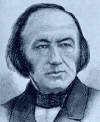 (source)
(source)
|
Claude Bernard
(12 Jul 1813 - 10 Feb 1878)
French physiologist who helped establish the principles of experimentation in the life sciences. His Introduction to the Study of Experimental Medicine (1865) is a scientific classic.
|
Claude Bernard Quotes on Science (32 quotes)
>> Click for 90 Science Quotes by Claude Bernard
>> Click for Claude Bernard Quotes on | Belief | Cause | Discovery | Experiment | Fact | Find | Great | Hypothesis | Idea | Knowledge | Life | Men Of Science | Mind | New | Observation | Phenomenon | Reasoning | Research | Seeking | Statistics | Theory | Truth | Understanding |
>> Click for 90 Science Quotes by Claude Bernard
>> Click for Claude Bernard Quotes on | Belief | Cause | Discovery | Experiment | Fact | Find | Great | Hypothesis | Idea | Knowledge | Life | Men Of Science | Mind | New | Observation | Phenomenon | Reasoning | Research | Seeking | Statistics | Theory | Truth | Understanding |
A l’aide de ces sciences expérimentales actives, l’homme devient un inventeur de phénomènes, un véritable contremaître de la création; et l'on ne saurait, sous ce rapport, assigner de limites à la puissance qu’il peut acquérir sur la nature, par les progrès futurs des sciences expérimentales
With the aid of these active experimental sciences man becomes an inventor of phenomena, a real foreman of creation; and under this head we cannot set limits to the power that he may gain over nature through future progress of the experimental sciences.
With the aid of these active experimental sciences man becomes an inventor of phenomena, a real foreman of creation; and under this head we cannot set limits to the power that he may gain over nature through future progress of the experimental sciences.
— Claude Bernard
Original French text in Introduction à l'Étude de la Médecine Expérimentale (1898), 32. English version from An Introduction to the Study of Experimental Medicine (1865), as translated by Henry Copley Greene (1957), 18.
À mesure que la science rabaisse ainsi notre orgueil, elle augmente notre puissance.
Science increases our power in proportion as it lowers our pride.
Science increases our power in proportion as it lowers our pride.
— Claude Bernard
Original French quote from Introduction à l’étude de la médecine expérimentale (1865), 141. As translated in Fielding H. Garrison, 'Medical Proverbs, Aphorisms and Epigrams', Bulletin of New York Academy of Medicine (Oct 1928), 4, No. 10, 997. The translation above is literal. For a clearer interpretation, see another version on this web page: “But by a marvellous compensation, science, in humbling our pride, proportionately increases our power.”
La théorie est l’hypothèse vérifiée, après qu’elle a été soumise au contrôle du raisonnement et de la critique expérimentale. La meilleure théorie est celle qui a été vérifiée par le plus grand nombre de faits. Mais une théorie, pour rester bonne, doit toujours se modifier avec les progrès de la science et demeurer constamment soumise à la vérification et à la critique des faits nouveaux qui apparaissent.
A theory is a verified hypothesis, after it has been submitted to the control of reason and experimental criticism. The soundest theory is one that has been verified by the greatest number of facts. But to remain valid, a theory must be continually altered to keep pace with the progress of science and must be constantly resubmitted to verification and criticism as new facts appear.
A theory is a verified hypothesis, after it has been submitted to the control of reason and experimental criticism. The soundest theory is one that has been verified by the greatest number of facts. But to remain valid, a theory must be continually altered to keep pace with the progress of science and must be constantly resubmitted to verification and criticism as new facts appear.
— Claude Bernard
Original work in French, Introduction à l'Étude de la Médecine Expérimentale (1865), 385. English translation by Henry Copley Green in An Introduction to the Study of Experimental Medicine (1927, 1957), 220.
Mais, par une merveilleuse compensation, à mesure que la science rabaisse ainsi notre orgueil, elle augmente notre puissance.
But by a marvellous compensation, science, in humbling our pride, proportionately increases our power.
But by a marvellous compensation, science, in humbling our pride, proportionately increases our power.
— Claude Bernard
Original French quote from Introduction à l’étude de la médecine expérimentale (1865), 141. As translated by H.C. Greene in An Introduction to the Study of Experimental Medicine (1927, 1949), 82. Most often seen quoted in a shorter, more literal translation as “Science increases our power in proportion as it lowers our pride” (detailed elsewhere on this web page).
A contemporary poet has characterized this sense of the personality of art and of the impersonality of science in these words,—“Art is myself; science is ourselves.”
— Claude Bernard
From An Introduction to the Study of Experimental Medicine (1865), as translated by Henry Copley Greene (1957), 43. The poet referred to was Victor Hugo, writing in William Shakespeare (1864).
A man of science rises ever, in seeking truth; and if he never finds it in its wholeness, he discovers nevertheless very significant fragments; and these fragments of universal truth are precisely what constitutes science.
— Claude Bernard
From An Introduction to the Study of Experimental Medicine (1927, 1957), as translated by Henry Copley Greene (1927, 1957), 222. From the original French by Claude Bernard: “le savant monte toujours en cherchant la vérité, et s'il ne la trouve jamais tout entière, il en découvre néanmoins des fragments très-importants, et ce sont précisément ces fragments de la vérité générale qui constituent la science.” (1865), 389. A Google translation gives: “The scientist always rises by seeking the truth, and if he never finds it entirely, he nevertheless discovers very important fragments of it, and it is precisely these fragments of the general truth which constitute science.”
Art is I; science is we.
— Claude Bernard
In Lily Splane, Quantum Consciousness (2004),307
But while I accept specialization in the practice, I reject it utterly in the theory of science.
— Claude Bernard
From An Introduction to the Study of Experimental Medicine (1865), as translated by Henry Copley Greene (1957), 25.
Even mistaken hypotheses and theories are of use in leading to discoveries. This remark is true in all the sciences. The alchemists founded chemistry by pursuing chimerical problems and theories which are false. In physical science, which is more advanced than biology, we might still cite men of science who make great discoveries by relying on false theories. It seems, indeed, a necessary weakness of our mind to be able to reach truth only across a multitude of errors and obstacles.
— Claude Bernard
An Introduction to the Study of Experimental Medicine (1865, translation 1927, 1957), 170.
First causes are outside the realm of science.
— Claude Bernard
From An Introduction to the Study of Experimental Medicine (1865), as translated by Henry Copley Greene (1957), 66.
Good methods can teach us to develop and use to better purpose the faculties with which nature has endowed us, while poor methods may prevent us from turning them to good account. Thus the genius of inventiveness, so precious in the sciences, may be diminished or even smothered by a poor method, while a good method may increase and develop it.
— Claude Bernard
I do not … reject the use of statistics in medicine, but I condemn not trying to get beyond them and believing in statistics as the foundation of medical science. … Statistics … apply only to cases in which the cause of the facts observed is still [uncertain or] indeterminate. … There will always be some indeterminism … in all the sciences, and more in medicine than in any other. But man’s intellectual conquest consists in lessening and driving back indeterminism in proportion as he gains ground for determinism by the help of the experimental method..
— Claude Bernard
From An Introduction to the Study of Experimental Medicine (1865), as translated by Henry Copley Greene (1957), 138-140.
If I had to define life in a single phrase, I should clearly express my thought of throwing into relief one characteristic which, in my opinion, sharply differentiates biological science. I should say: life is creation.
— Claude Bernard
From An Introduction to the Study of Experimental Medicine (1865), as translated by Henry Copley Greene (1957), 93.
If needed to give a comparison expressing my feelings about the science of life, I would say that it is a magnificent reception room, resplendent with light, which one can only reach by passing through a long and dreadful kitchen.
— Claude Bernard
In Introduction à l'Étude de la Médecine Expérimentale (1865), 23. From the original French, “S’il fallait donner une comparaison qui exprimât mon sentiment sur la science de la vie, je dirais que c’est un salon superbe tout resplendissant de lumière, dans lequel on ne peut parvenir qu’en passant par une longue et affreuse cuisine.” English version by Webmaster using Google Translate. This version has additional context than the customary translation, elsewhere on this web page, that begins, “The science of life is a superb….”
In a word, I consider hospitals only as the entrance to scientific medicine; they are the first field of observation which a physician enters; but the true sanctuary of medical science is a laboratory; only there can he seek explanations of life in the normal and pathological states by means of experimental analysis.
— Claude Bernard
From An Introduction to the Study of Experimental Medicine (1865), as translated by Henry Copley Greene (1957), 146.
In science the important thing is to modify and change one's ideas as science advances.
— Claude Bernard
As given by in Bertha McCool, 'The Development of Embryology', Bios (Oct 1935), 6, No. 3, 303. Also in Rudolf Franz Flesch, The Art of Clear Thinking (1951), 122. Webmaster has also seen this attributed to Herbert Spencer, but has yet found such examples date only after 1997. If you know the primary source from Bernard, please contact Webmaster.
In sciences of observation, man observes and reasons experimentally, but he does not experiment; and in this sense we might say that a science of observation is a passive science. In sciences of experimentation, man observes, but in addition he acts on matter, analyzes its properties and to his own advantage brings about the appearance of phenomena which doubtless always occur according to natural laws, but in conditions which nature often has not yet achieved. With the help of these active experimental sciences, man becomes an inventor of phenomena, a real foreman of creation; and under this head we cannot set limits to the power that he may gain over nature through future progress in the experimental sciences.
— Claude Bernard
From Introduction à l'Étude de la Médecine Expérimentale (1865); as translated by Henry Copley Greene, in An Introduction to the Study of Experimental Medicine (1927, 1957), 18. As given, for example, in Fielding Hudson Garrison, An Introduction to the History of Medicine (1929), 15. Compare the (apparent?) summary of this quote, expressed as, “Observation is a passive science, experimentation is an active science.” The shorter quote is seen for example, in Fielding Hudson Garrison, An Introduction to the History of Medicine (1929), 15. However, Webmaster has not yet found these few words verbatim in a primary source, and believes although the shortened quote is a summary, in very few words, of the idea expressed in the longer passage above, that it was not written verbatim by Bernard himself.
In teaching man, experimental science results in lessening his pride more and more by proving to him every day that primary causes, like the objective reality of things, will be hidden from him forever and that he can only know relations.
— Claude Bernard
…...
Laplace considers astronomy a science of observation, because we can only observe the movements of the planets; we cannot reach them, indeed, to alter their course and to experiment with them. “On earth,” said Laplace, “we make phenomena vary by experiments; in the sky, we carefully define all the phenomena presented to us by celestial motion.” Certain physicians call medicine a science of observations, because they wrongly think that experimentation is inapplicable to it.
— Claude Bernard
From An Introduction to the Study of Experimental Medicine (1865), as translated by Henry Copley Greene (1957), 18. A footnote cites Laplace, Système du monde, Chap. 2.
Mediocre men often have the most acquired knowledge. It is in the darker. It is in the darker regions of science that great men are recognized; they are marked by ideas which light up phenomena hitherto obscure and carry science forward.
— Claude Bernard
From An Introduction to the Study of Experimental Medicine (1865), as translated by Henry Copley Greene (reprint 1999), 42.
Observation is a passive science, experimentation is an active science.
— Claude Bernard
As given, for example, in Fielding Hudson Garrison, An Introduction to the History of Medicine (1929), 15. Webmaster has not found these words verbatim in a primary source, and believes there are summary of an idea expressed in a longer passage. See the quotation beginning “In sciences of observation,” elsewhere on this web page. From Introduction à l'Étude de la Médecine Expérimentale (1865); as translated by Henry Copley Greene, in An Introduction to the Study of Experimental Medicine (1927), 18.
Real science exists, then, only from the moment when a phenomenon is accurately defined as to its nature and rigorously determined in relation to its material conditions, that is, when its law is known. Before that, we have only groping and empiricism.
— Claude Bernard
From An Introduction to the Study of Experimental Medicine (1865), as translated by Henry Copley Greene (reprint 1999), 74.
Science allows no exceptions; without this there would be no determinism in science or rather, there would be no science at all.
— Claude Bernard
In Leçons de Pathologie Experimental (1871).
Science rejects the indeterminate.
— Claude Bernard
In An Introduction to the Study of Experimental Medicine (1927, 1957), 55, as translated by Henry Copley Greene. From the original French by Claude Bernard: “La science repousse l’indeterminé.” (1865), 96. Also seen in alternate translation as: “Science repulses the indefinite.”
The doubter is a true man of science: he doubts only himself and his interpretations, but he believes in science.
— Claude Bernard
In Fielding Hudson Garrison, An Introduction to the History of Medicine (1929), 14.
The goal of scientific physicians in their own science … is to reduce the indeterminate. Statistics therefore apply only to cases in which the cause of the facts observed is still indeterminate.
— Claude Bernard
From An Introduction to the Study of Experimental Medicine (1865), as translated by Henry Copley Greene (1957), 139.
The science of life is a superb and dazzlingly lighted hall which may be reached only by passing through a long and ghastly kitchen.
— Claude Bernard
From Introduction à l'Étude de la Médecine Expérimentale (1865), translated by Henry Copley Greene, in An Introduction to the Study of Experimental Medicine (1927, 1957), 15. As extracted in John Bartlett and Emily Morison Beck (ed.), Familiar Quotations (1980, 15th ed.), 551.
Theories are like a stairway; by climbing, science widens its horizon more and more, because theories embody and necessarily include proportionately more facts as they advance.
— Claude Bernard
From An Introduction to the Study of Experimental Medicine (1865), as translated by Henry Copley Greene (1957), 165.
To be worthy of the name, an experimenter must be at once theorist and practitioner. While he must completely master the art of establishing experimental facts, which are the materials of science, he must also clearly understand the scientific principles which guide his reasoning through the varied experimental study of natural phenomena. We cannot separate these two things: head and hand. An able hand, without a head to direct it, is a blind tool; the head is powerless without its executive hand.
— Claude Bernard
In Claude Bernard and Henry Copley Greene (trans.), An Introduction to the Study of Experimental Medicine (1927, 1957), 3.
True science teaches us to doubt and, in ignorance, to refrain.
— Claude Bernard
…...
We see, then, that the elements of the scientific method are interrelated. Facts are necessary materials; but their working up by experimental reasoning, i.e., by theory, is what establishes and really builds up science. Ideas, given form by facts, embody science. A scientific hypothesis is merely a scientific idea, preconceived or previsioned. A theory is merely a scientific idea controlled by experiment. Reasoning merely gives a form to our ideas, so that everything, first and last, leads back to an idea. The idea is what establishes, as we shall see, the starting point or the primum movens of all scientific reasoning, and it is also the goal in the mind's aspiration toward the unknown.
— Claude Bernard
From An Introduction to the Study of Experimental Medicine (1865), as translated by Henry Copley Greene (1957), 26.
Well-observed facts, though brought to light by passing theories, will never die; they are the material on which alone the house of science will at last be built.
— Claude Bernard
From An Introduction to the Study of Experimental Medicine (1865), as translated by Henry Copley Greene (1957), 165.
See also:
- 12 Jul - short biography, births, deaths and events on date of Bernard's birth.
- Claude Bernard - context of quote The alchemists founded chemistry - Medium image (500 x 350 px)
- Claude Bernard - context of quote “The alchemists founded chemistry” - Large image (800 x 600 px)
- Claude Bernard - context of quote The experimenter - Medium image (500 x 350 px)
- Claude Bernard - context of quote The experimenter - Large image (800 x 600 px)
- Claude Bernard - context of quote Make experiments to … control our ideas - Medium image (500 x 350 px)
- Claude Bernard - context of quote Make experiments to … control our ideas - Large image (800 x 600 px)
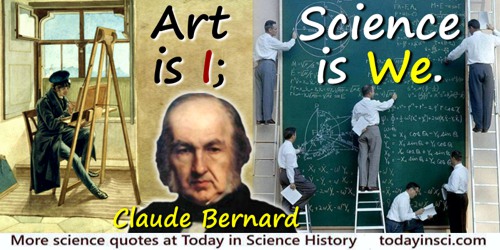
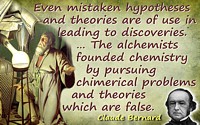
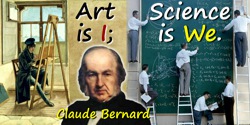
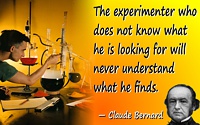
 In science it often happens that scientists say, 'You know that's a really good argument; my position is mistaken,' and then they would actually change their minds and you never hear that old view from them again. They really do it. It doesn't happen as often as it should, because scientists are human and change is sometimes painful. But it happens every day. I cannot recall the last time something like that happened in politics or religion.
(1987) --
In science it often happens that scientists say, 'You know that's a really good argument; my position is mistaken,' and then they would actually change their minds and you never hear that old view from them again. They really do it. It doesn't happen as often as it should, because scientists are human and change is sometimes painful. But it happens every day. I cannot recall the last time something like that happened in politics or religion.
(1987) -- 


